Alumnus of the Year criticises UU's Sustainable Industries Lab
'Scientists allow themselves to be used as fossil fuel storytellers'
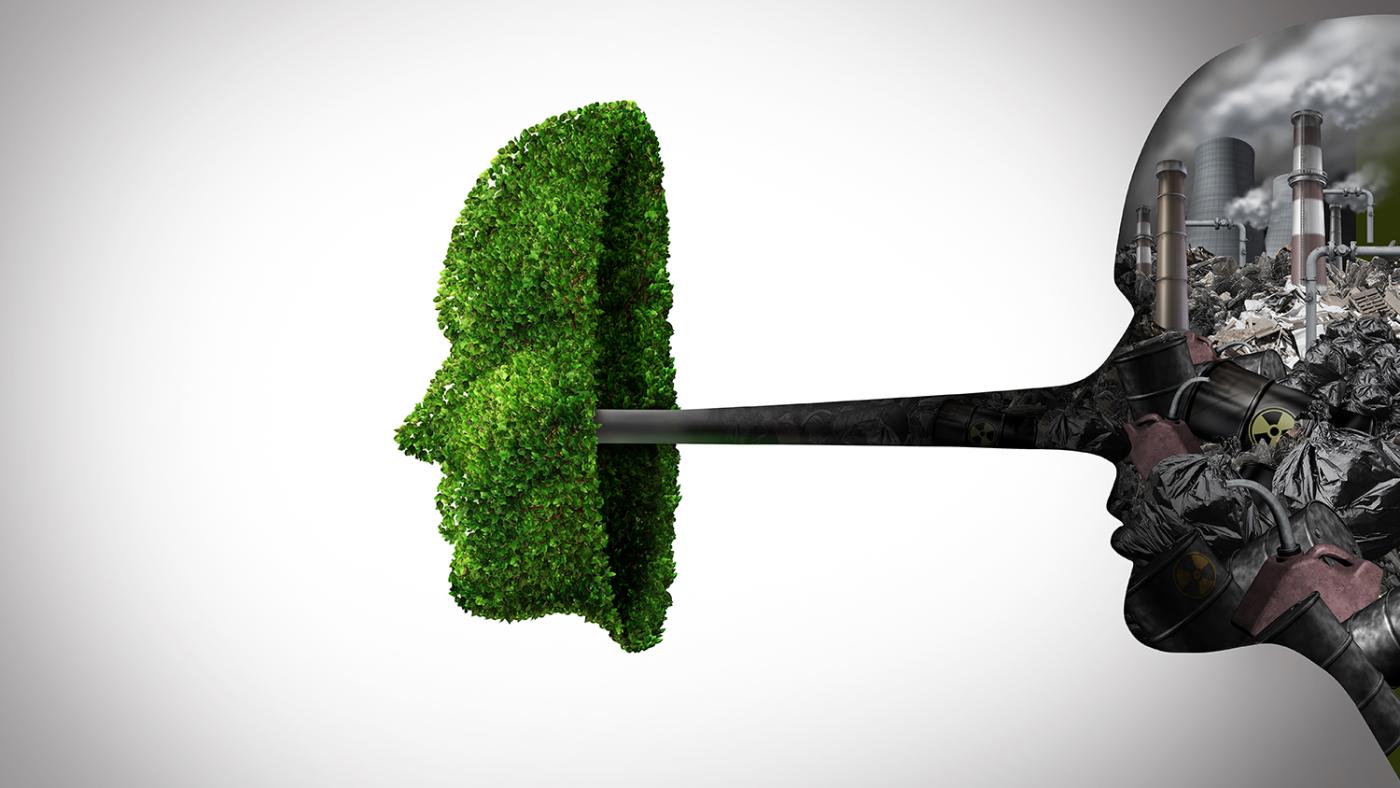
It was an uncomfortable recognition. In March 2025, Utrecht University named me Alumnus of the Year for my efforts to shift funding from fossil fuels to sustainable energy. The university celebrated climate activism, but for climate activists, it was no cause for celebration.
UU had promised to sever its ties with the fossil fuel industry, but then announced, with a framework full of loopholes, that current partnerships with the fossil fuel industry could go on. A committee set up by the university – with nine members of whom four are themselves involved in cooperations with the fossil fuel industry – appears to have been outmanoeuvred by the Executive Board, which further weakened the assessment framework. ‘In principle, the existing consortia are working well and we intend to continue with them,’ said the new Rector, Wilco Hazeleger, on DUB.
This is an embarrassing display for a university that wants to guide ‘necessary transformations’ and sees itself as a ‘catalyst for change.’ It shows that the university still does not understand how it is a pawn in the fossil fuel industry's game.
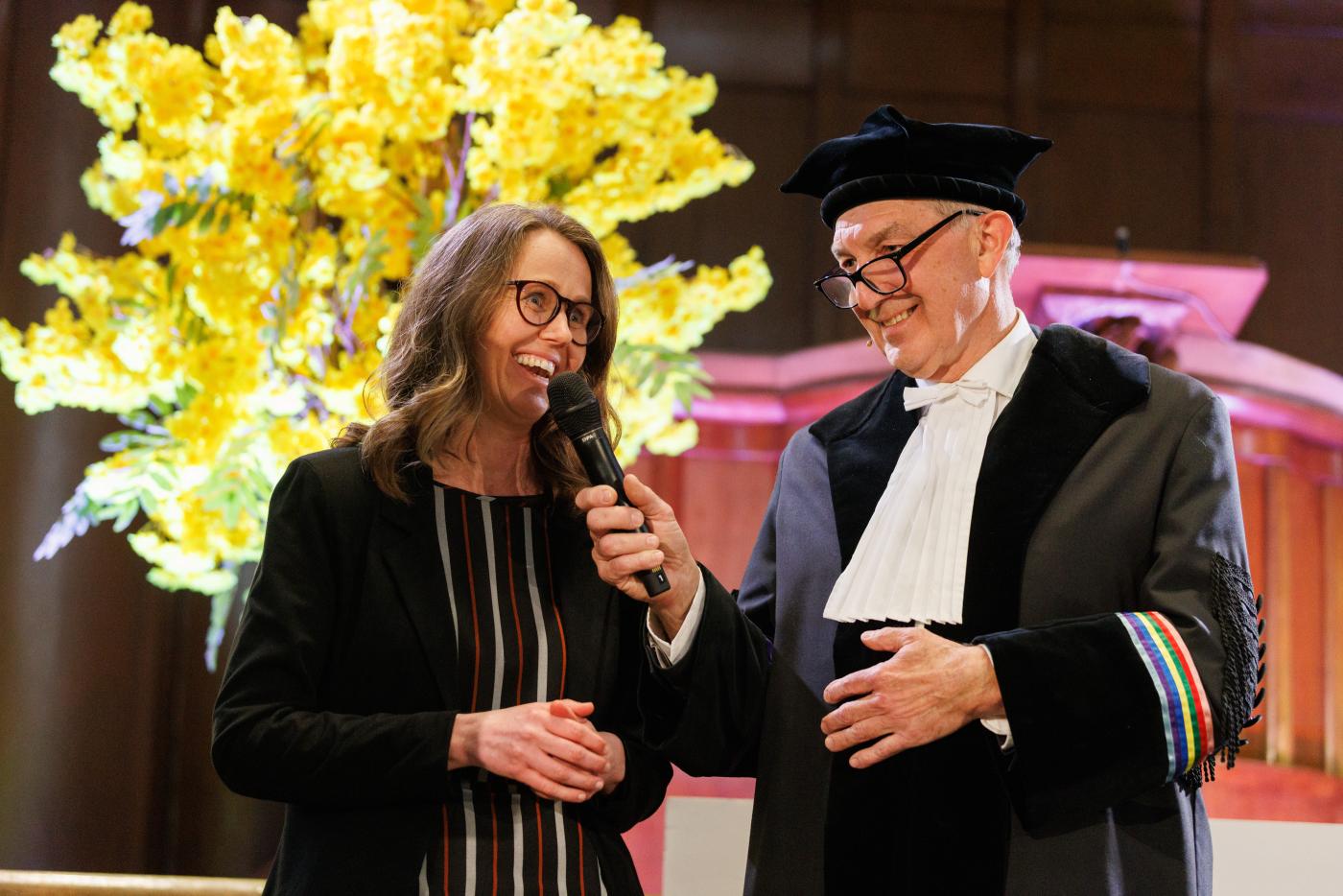
Hiske Arts was interviewed by UU President Anton Pijpers at the university's anniversary ceremony earlier this year. Photo: Bas van Hattem, Utrecht University
Scientists as storytellers for the fossil fuel industry
The collaboration between universities and the fossil fuel industry strikes at the heart of all climate activism. Climate science shows the effects of an increase in greenhouse gases and the need for reduction; it also analyses the effectiveness of climate measures. Therefore, science is essential for us, climate activists, to understand where we need to focus and what measures we need to advocate.
Climate activists are not the only ones who follow science closely: politicians and policymakers build on scientific findings, journalists ask scientists to interpret the news in order to add authority to the climate debate, and judges base their decisions on scientific conclusions in the most high-profile climate cases. This is why Shell was not given a concrete reduction target by the court in 2024: because there is no consensus in academia regarding the reduction percentage that should apply to a company like Shell.
The fossil fuel industry knows very well how important it is to get scientists on its side. Whereas in the past the aim was to sow doubt about the cause of climate change, today the fossil fuel industry has switched to a delay strategy, focusing on false solutions. These solutions justify the continuation of fossil fuel extraction by touting technologies that have yet to prove themselves, such as carbon capture or hydrogen. Scientists play a central role in this strategy. The fossil fuel industry is only too happy to use them as storytellers now that its image has been so badly tarnished.
One of these stories is that fossil gas, one of the causes of the current climate crisis, is actually a solution. Gas is a last resort for companies like Shell. Since liquefied gas is traded on the global market, there is a lot of money to be made from it. Shell, the world's largest trader in liquefied gas, derived more than 50 per cent of its profits from its gas division in 2022: 20 billion euros of its total profits of 38 billion euros. With demand for its other products expected to decline, a positive image for gas is vital for them, and something that has been actively pursued for decades.
Internal documents from the fossil fuel industry show time and again that it deliberately establishes relationships with knowledge institutions to get ‘neutral voices’ on its side. An internal strategy document from Shell also shows that they deliberately collaborate with scientists to reduce the impact of negative publicity about gas and discredit research they label as “weak”, all with the goal of giving gas a positive image. Therefore, scientists and universities play a crucial role in the strategy of fossil fuel companies.
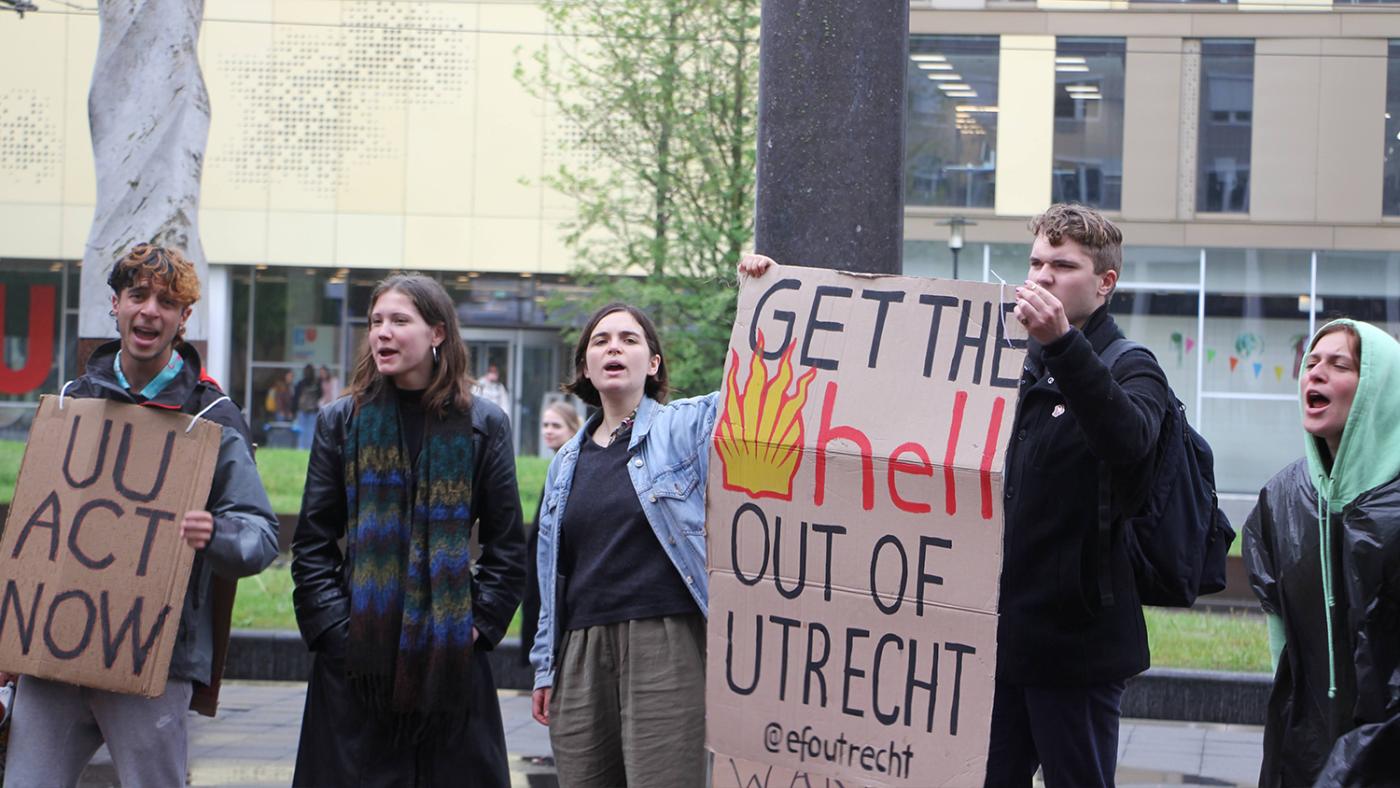
‘Neutral’ communication together with the fossil fuel industry
The major interests at stake seem to have hardly penetrated the minds of scientists who collaborate with the fossil fuel industry. This is also the case at Utrecht University. For example, university lecturer Sanne Akerboom, founder of the Sustainable Industries Lab, said that, after talking to partners such as Shell and Esso, she concluded ‘that we had shared goals about pooling knowledge, communicating neutrally about choices and consequences, and improving the quality of the political and social debate’. Imagine a university collaborating with the tobacco industry to provide ‘neutral’ information about choosing a vape over a cigarette.
The Sustainable Industries Lab aims to achieve a ‘climate-neutral industry’ by ‘synthesising academic and expert knowledge’. In addition to substantive cooperation, part of the lab's funding comes from the fossil fuel and chemical industries. Lobby groups such as VNO-NCW, the Dutch gas lobby Element NL and Vemobin (the Association for Energy for Mobility and Industry) contribute financially.
Although Akerboom says that the lab does not make choices but only provides ‘objective knowledge’ that can be used to make choices, in practice, the lab does issue firm recommendations. For example, the main conclusion of one of the reports by the Sustainable Industries Lab is that the basic industry – the heavy industry that supplies products such as plastic, synthetic materials and steel – can become sustainable and circular in the Netherlands by 2050, which requires a “production promise” for the basic industry. The conclusion that industry must remain in the Netherlands is strongly promoted by the Lab's chairman, Professor of Energy & Resources Gert Jan Kramer, in media interviews. He says that sustainable production can only start after 2030. This conclusion is also often linked to calls for more CO2 storage centres, more blue hydrogen and even more long-term LNG contracts, solutions that would make the Netherlands dependent on gas imports in the long term. These conclusions are undoubtedly well received by the industry itself.
In practice, a choice to preserve basic industry and focus on the gradual conversion of existing polluting industries means government support and tax breaks for these industries. After all, basic industry is threatening to leave if this support is not provided. But it is precisely these fossil fuel subsidies that are at the expense of sustainable and circular industries that cannot compete and are therefore losing out. Moreover, from an energy perspective, it may be much more efficient to locate industry in parts of Europe where more sustainable energy is available. For this reason, another group of scientists argues that we should stop artificially extending the life of sectors with no future in the Netherlands so we can make room for sustainable industries. The composition of the Sustainable Industry Lab makes it difficult to imagine that this consortium could have reached the same conclusion.
This report by the Sustainable Industry Lab was produced with input from a group of experts, at least half of whom have close ties to industry, which raises questions about how independent the advice is. When does business interest speak, and when does the climate speak? It is impossible to disentangle the two, and undesirable as well.
Remarkably, Sanne Akerboom, who has worked hard to promote cooperation with the industry (including the fossil fuel industry), was part of the UU committee that was tasked with reviewing the new assessment framework. Even more damaging is that the chair of this committee indicates that the proposed assessment framework has been further weakened by the Executive Board, which has exempted existing consortia from the framework. The new UU Rector, Wilco Hazeleger, who is championing this, is himself chair of the Supervisory Board of the Sustainable Industry Lab.
‘Alarmist’ research into methane
The media has also taken a liking to the Sustainable Industry Lab. For example, the national newspaper NRC recently featured Kramer – co-founder and board member of the lab and a former Shell employee – as an expert on liquid gas. He was given space in the newspaper to share his view on Professor Robert Howarth's research. Professor Howarth, who has been an expert on gas extraction and methane leaks for decades, recently concluded, based on a life cycle assessment, that if Europe imports liquid gas from the US, it will be more harmful than coal due to the high methane emissions in the liquid gas chain.
Howarth's finding touches on one of the biggest climate issues of our time: the ever-increasing amount of methane in the atmosphere. Methane is an extremely powerful greenhouse gas, which in the short term is 85 times more powerful than CO2. Although it breaks down in the atmosphere after about ten years, it causes a strong warming effect during that period. It is estimated that as much as 0.5 degrees of the current 1.2 degrees of global warming is caused by methane. So, if the world could quickly reduce methane emissions, that would help us tackle the climate crisis. But if, instead, methane emissions increase, we will have an even bigger problem.
In his response in the NRC newspaper, Kramer played down concerns about liquefied gas – although he does acknowledge that methane is a problem – and pointed out that gas is indeed a 'transition fuel'. Kramer accuses Howarth of bias: 'The figures he uses are not wrong, but if you consistently sit on the wrong side of the median, you will ultimately arrive at a relatively alarmist result.
Howarth bases his findings on a study published in Nature that concludes, based on a million measurements, that 2.8 per cent of US gas production leaks. This is three times more than the industry's own reports.
In the interview with NRC, Kramer refers to a critical (non-peer-reviewed) commentary he wrote with colleagues – some of whom are themselves affiliated with the fossil fuel industry – on another article by Howarth about blue hydrogen, in which the CO2 released during production is stored underground. The critics base their arguments on as yet unproven promises and targets made by the fossil fuel industry, rather than realistic estimates based on practical examples and measurements. The assumptions determine the outcome.
It is striking that Kramer and co are not the first to criticise Howarth. Shell has also opposed it, as an internal strategy document shows. In it, Shell says it will not respond to this in the media but prefers to refer to ‘reliable third parties’ instead. Kramer's commentary is undoubtedly one of these ‘reliable’ third parties, as it raises exactly the same criticisms and figures as Shell does in its strategy document. [RA1]
Figures from the industry itself
With a fossil fuel industry that repeatedly casts doubt, makes false promises and has a vested interest in delaying effective climate policy, scientists are tasked with being the critical voice, not the one that stifles it. When figures deviate from what the fossil fuel industry tells us, we need scientists who see this as a reason to take a close look at what previous figures were based on, rather than immediately dismissing them as alarmist. Scientists who make their reservations clear when figures on methane emissions are based on self-reporting, especially when multiple studies show that methane emissions are systematically underestimated. They need to realise that the fossil fuel industry has a track record of unfulfilled promises and not just blindly accept its claims. They must be aware of the influence of the fossil fuel industry and be able to reflect critically on it.
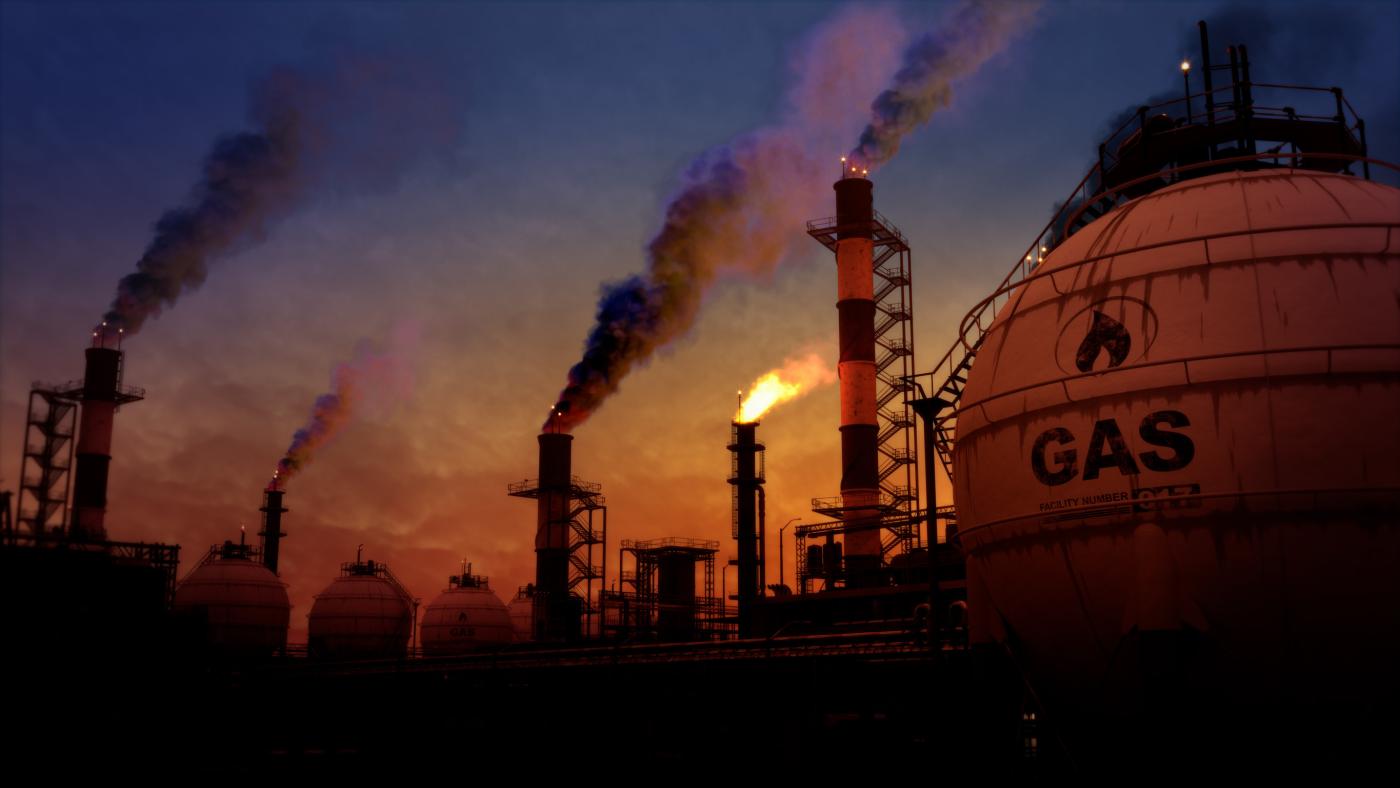
Foto: 123rf
Conclusion: Working together means moving towards each other
It is worrying when scientists who are closely linked to the fossil fuel industry are allowed to fact-check independent scientists in newspapers and scientific publications. Their words have major consequences for how we Europeans continue to use gas and the solutions chosen. It is not without reason that Shell deliberately chooses not to respond to unfavourable results itself, but instead refers to the findings of respected parties.
I would like to clarify one point in advance: my criticism of the collaboration between academia and the fossil fuel industry leaves open the question of whether scientists are deliberately slowing down the transition or being influenced without realising it. In many cases, influence will occur at a subtle level, with scientists automatically adapting themselves slightly to their partners. After all, that is what you do in a partnership: you move towards each other. You formulate a research question together and agree on a framework. Your thinking is influenced by your partner. Research shows that research results arising from collaborations with the energy sector are more positive about fossil fuels than research conducted without such collaboration. In addition, university centres funded by the gas industry are more positive about fossil gas than university centres that are not. So, who do you give the benefit of the doubt to, or in the words of the Utrecht-based professor, “which side of the median you sit on”? Do you trust your partner?
It should not be up to the people who currently collaborate with the fossil fuel industry to assess the independence of their partnerships. The fact that the Executive Board subsequently weakened the committee's advice shows how entrenched the university is in the fossil fuel industry and how naive and blind it is to the power dynamics at play in the background.
Everyone committed to effective climate policy – from climate activists to the business community, from pension fund managers to politicians – needs independent climate research. The task of university administrators is to create the conditions for independent research and to prevent (the appearance of) conflicts of interest, which means that cooperation with the fossil fuel industry must be discontinued. Let the university contribute to solving the climate crisis, instead of being a pawn of the fossil fuel industry.
This op-ed was submitted by Hiske Arts, campaign leader for Fossielvrij Nederland (Fossil Free Netherlands) and this year's Alumnus of the Year. The views expressed above belong to the author alone and do not necessarily represent DUB's point of view.
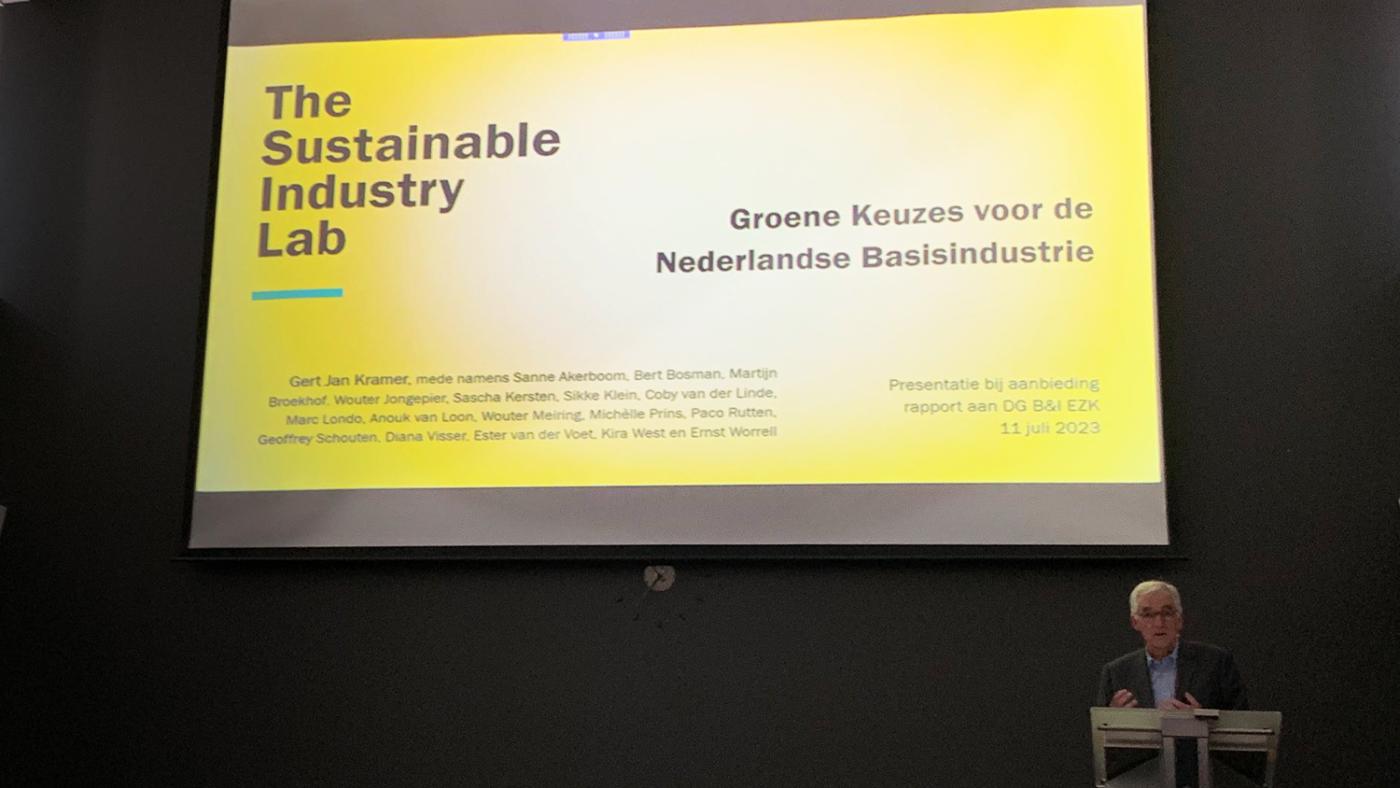
Sustainable Industry Lab response to Hiske Arts' opinion piece
Like Hiske, we are motivated in our work to make an active contribution to solving the climate problem. But where Hiske and Fossielvrij NL have opted for a protest agenda focused on excluding fossil fuel companies and phasing out fossil fuel-related economic activities, the Sustainable Industry Lab takes an inclusive approach. We are investigating what a sustainable industry in the Netherlands could look like, involving as broad a spectrum of stakeholders as possible – from environmental organisations to oil companies, from scientists to civil servants. Our goal is to identify the choices and consequences of the transition to a sustainable industry in the Netherlands and Europe.
While we understand the motivations displayed by Hiske and her movement, we have less understanding for the picture her op-ed paints of the work done by the Sustainable Industry Lab and of us as individuals.
Hiske was kind enough to give us her article to review. In response, we shared a detailed response in which we pointed out how she paints an inaccurate picture of both of us and the SIL through insinuations based on highly selective quotes. This detailed response can be found on Gert Jan Kramer's website. Unfortunately, Hiske has chosen to ignore this response. She informed us that, 'on several occasions, what we call a factual inaccuracy is actually a difference of opinion.' However, ‘facts’ taken completely out of context can easily become untruths, or at the very least, present a highly distorted picture.
A striking example of this is her description of the SIL report Green Choices for the Dutch Basic Industry, from 2023. This is presented as a plea for an industrial production promise that will lead to ‘fossil fuel subsidies’ to keep ‘industries threatening to leave’ here, and thus ‘artificially prolong the life of sectors with no future in the Netherlands.’ Nowhere in this SIL report is there any mention of fossil fuel subsidies. Based on technical analysis, the report concludes that a climate-neutral and circular basic industry in the Netherlands does indeed have a future, thanks to the unique potential of wind in the North Sea near the port-industrial complex of North-West Europe. In addition, we also present a moral argument, namely that a prosperous country with good governance and a knowledge infrastructure must make a serious contribution to this.
Our goal remains to listen to each other and use the facts presented to improve our understanding of complex issues and thus build a clean and sustainable future. That is what we stand for, and that is what SIL stands for.
Gert Jan Kramer , Chair of the Board Sustainable Industry Lab
Sanne Akerboom, director of Sustainable Industry Lab, and assistant professor of Regulation and Governance of the Energy Transition at the Copernicus Institute of Sustainable Development and Professor of Sustainable Energy Supply Systems at the Copernicus Institute of Sustainable Development